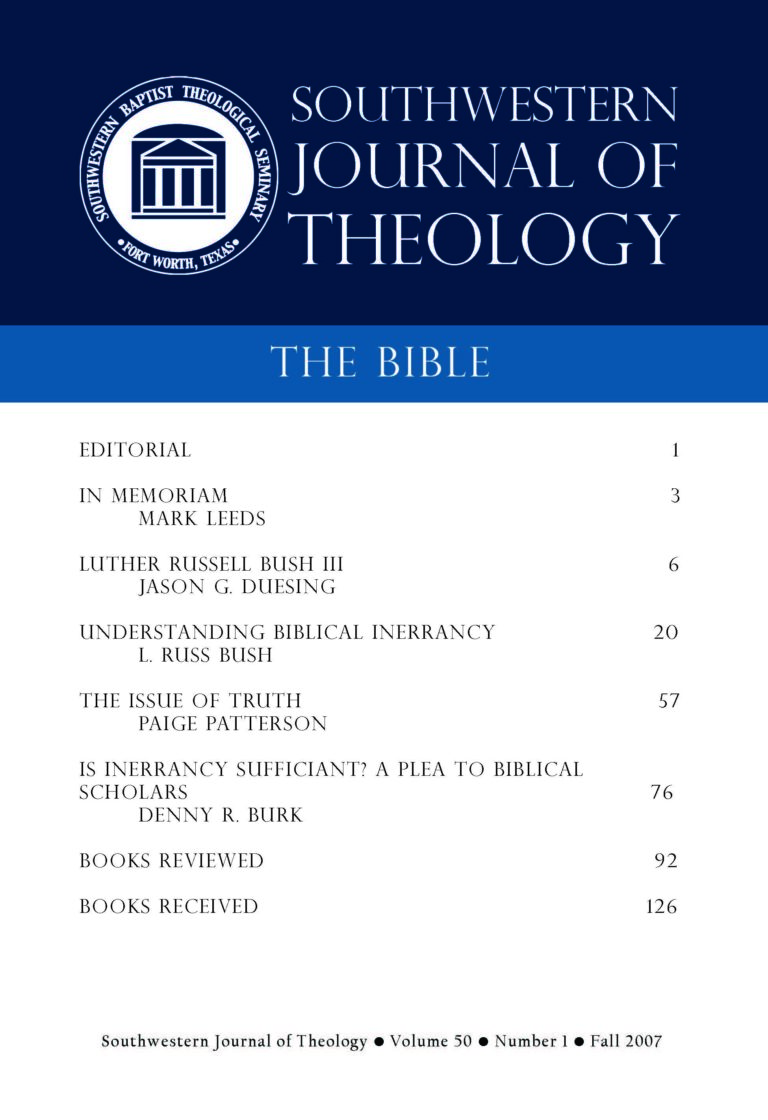
The Bible
Southwestern Journal of Theology
Volume 50, No. 1 – Fall 2007
Managing Editor: Malcolm B. Yarnell III
Before and during the Conservative Resurgence in the Southern Baptist Convention (SBC), Southwestern Baptist Theological Seminary in Fort Worth,Texas was generally reputed a conservative school.Testing such assumptions regarding the theological balance within the six seminaries, the Southern Baptist Convention Peace Committee in 1987 cited Southeastern Baptist Theological Seminary in Wake Forest, North Carolina and the Southern Baptist Theological Seminary in Louisville, Kentucky for not employing biblical inerrantists,1 thus indicating their departure from the common theology of the churches. However, in agreement with its reputation amongst the same churches, the Peace Committee apparently exonerated Southwestern Baptist Theological Seminary.
One faculty member at Southwestern Seminary during that critical period preceding the triumph of the conservatives in the SBC, and one reason for such an apparent exoneration, was Luther Russell Bush III, a professor of philosophy who received two graduate-level degrees from the school. Bush, soon after the Peace Committee Report, left Southwestern Seminary so as to help lead Southeastern Seminary’s faculty into the inerrantist fold. Bush, who once offered this editor—at the time a fellow academic dean—friendly and useful counsel for serving a faculty, recently departed us to be with the Lord. This journal issue is dedicated to Dean Bush and to what may be regarded his most critical theological legacy, convictional affirmation of the Bible as the inerrant Word of God.
In this first issue of the fiftieth volume of the Southwestern Journal of Theology, please take a moment to peruse the memories of one of Bush’s doctoral students, Mark Leeds, now the Registrar at Bush’s alma mater. Leeds provides firsthand testimony regarding Bush’s commitment to students, a commitment that fostered a passion for biblical faith. Jason G. Duesing, who studied with Bush at Southeastern Seminary and is now Assistant Professor of Historical Theology at Southwestern Seminary, provides a biographical sketch that should aid further research into the background and impact of Bush’s life as well as further research into his theology and philosophy.
The bulk of this issue consists of three theological essays focused upon the Bible and its authority for the Christian theologian. First, with the permission of his widow, Mrs. Cynthia Ellen McGraw Bush, we have reprinted a lesser-known work by Bush entitled, “Understanding Biblical Inerrancy.” This essay was self-published by Bush in 1988, under the trademark of Columbia Publications in Fort Worth, at a time when conservatives in the churches still wondered whether they could win the minds of scholars back to complete trust in the Bible’s inerrant authority. Bush’s essay, a fairly comprehensive yet concise and irenic defense of biblical inerrancy, was an early indicator that not only is inerrancy a respectable Christian intellectual position it is the most faithful Christian intellectual position. Our hope is that Bush’s essay will energize the academy once again but this time with a wider audience.
Second, we also reprint here another difficult-to-find essay, an essay that was instrumental in the resurgence of conservative theology. In 1979, soon after the first and tenuous presidential victory of the Conservative Resurgence, Paige Patterson penned “The Issue Is Truth,” which appeared under the mark of the Shophar Papers in Dallas, Texas. Patterson, who once served as President of Criswell College and as Bush’s President at Southeastern Seminary, and who is now President of Bush’s alma mater, possesses an uncanny ability to disseminate his theological ruminations in the ecclesiastical realm in spite of less than enthusiastic responses by official ecclesiastical publishers. Patterson’s essay is as theologically relevant today as it was thirty years ago, and alongside Bush’s essay it provides a reminder as to why the Southern Baptist Convention must maintain the doctrine of biblical inerrancy in its academies as well as the churches.
Finally, a younger scholar formerly at Criswell College, Denny R. Burk, suggests the theological conservation of the Southern Baptist Convention should go one step further. Burk fully embraces the doctrine of inerrancy, but opines that inerrancy, on its own, is not enough. Inerrancy is necessary, but so is the doctrine of Scripture’s sufficiency. Burk’s plea for scholars to embrace biblical sufficiency is addressed specifically for the growing difficulties being experienced in the Evangelical Theological Society, over which Bush once presided. The thesis of Burk, now the Dean at the Boyce College of the Southern Baptist Theological Seminary, should be examined, however, not only in the academy. The churches should also consider Burk’s warning, because the implications of holding to biblical inerrancy without concurrently maintaining the Bible’s sufficient authority for Christian faith and practice are profound and disturbing, to say the least.
- “Report of the Southern Baptist Convention Peace Committee,” II Findings, On Theology, in Proceedings of the Southern Baptist Convention: 1987 SBC Annual (Nashville: Executive Committee, 1987), 56, 232–42. ↩︎





